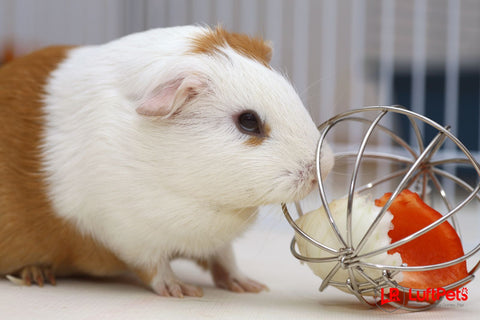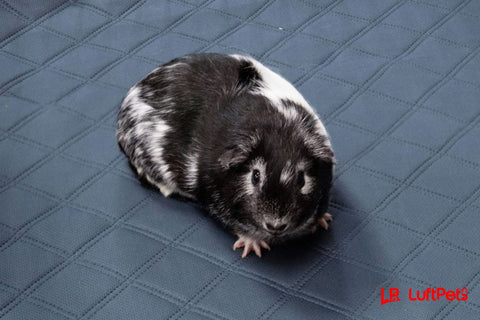Do you want to know what essential guinea pig supplies you need to welcome your new pet home?
When I got my first cavy, I was so overwhelmed that I forgot a few basic things and had to go emergency shopping at the nearest pet shop.
Fortunately, I'm here to ensure you don't make the same mistake and have everything ready for your furry friend.
Just keep reading.
Key Takeaways
- A cage of proper size, bedding, and suitable food are essential items to buy before adopting guinea pigs.
- Find an exotic veterinarian to take care of your pet if it gets sick, and consider getting pet insurance to manage costs.
- Don't forget to buy cleaning supplies to maintain cage hygiene and prepare an emergency first-aid kit.
15 Essential Guinea Pig Supplies
Before I get to my list of essential supplies for your furry pet, let me give you some advice. Guinea pigs are social creatures and are unhappy when alone in the cage.
Similarly, if you have other small pets like rats, it's equally important to ensure you have suitable rat cage liners for their comfort.
If you're considering getting a guinea pig, it's best to adopt at least two so your pets have a companion to play and cuddle with. So, plan to get enough supplies for two piggies!
And what essential guinea pig supplies do you need? Here are 15 essential items to add to your shopping list!
#1 A Guinea Pig Cage
Cavies need a proper size cage to provide exercise opportunities, relieve boredom, and express natural behaviors, such as digging.

It's also vital to ensure your cavy has enough space to feel comfortable, or it can start to fight with the other piggies in the cage.
The problem is that many commercial pet cages are too small. And small enclosures lead to unhappy and bored cavies, prone to health issues due to lack of exercise.
According to The Human Society of the United States, two guinea pigs should have a minimum of 7..5 square feet, but 10.5 square feet (30" x 50") is preferred. (1)
A larger cage is also easier to maintain because the piggies have plenty of floor space to use as a toilet, which prevents waste build-up and unpleasant odors.
Besides size, the guinea pig habitat should be well-made. Cavies are natural chewers and will eat through flimsy material to escape.
It's best to go for a C&C cage (cubes and coroplast). It has a solid base from corrugated plastic, and the frame is powder-coated steel, so your guinea pig won't be able to escape.
Avoid wire-bottom cages because cavies have sensitive feet, and the wire can cause sores. Glass tanks or plastic tubs are also unsuitable habitats for guinea pigs.
#2 Bedding
Once you get a proper cage for your furry friends, it's time to shop for suitable guinea pig bedding. The most popular choices for guinea pigs are:
- Reusable bedding, such as fleece.
- Disposable bedding, such as paper bedding, wood shavings, hemp, cage liners, etc.
Fleece is an excellent option because it absorbs urine quickly and is soft and comfortable. Reusable liners are also great because they're easy to wash, don't generate dust and control odors.
But you should wash fleece and reusable cage liners every few days because they get stinky quickly. They're more expensive at first than disposable options, but they're cheaper in the long run. Here's how long reusable cage liners last.
On the other hand, paper-based bedding can last up to a week before throwing it and replacing it (provided you do daily spot cleaning).
But paper or wood bedding is harder to clean than fleece because you must scrape it off the bottom of the cage. And using disposable bedding is expensive in the long run.
So, which bedding should you go for? I recommend Luftpets cage liners because they're waterproof, non-slip, and easy to maintain. You can combine them with fleece or another type of bedding.
You can also go for fleece or paper-based bedding (it should be at least 2-3 inches deep to ensure the urine soaks to the bottom). But avoid the following:
- Cedar and pine shavings. They contain oils that are toxic to cavies.
- Disposable puppy pads. They're great at absorbing urine, but it can be dangerous if your pet chews them.
- Hay or straw. It gets wet and stinky quickly, doesn't control odor, and can hurt your cavies' paws.
- Cat litter. It's too dusty and can lead to intestinal obstruction if ingested.
#3 Water Bottle
Guinea pigs should have access to clean water at all times. So, the next time on my list of essential supplies for guinea pigs is a water bowl/bottle.
Most guinea pigs prefer drinking from a water bottle. But getting a bowl is still a good idea until you know your pet's preferences.
Moreover, it's best if your cavies have an alternative source of fresh water if the sipper bottle gets clogged or damaged.
Look for sipper bottles made from glass or BPA-free, non-toxic material. Water bowls should be ceramic and heavy, so your cavy can't tip it and get the cage wet.
You need at least two water bottles/bowls, even if you have only one cavy. And you should wash and replace the water daily.
#4 Food Bowls
Food bowls should be heavy, non-tip, and made from ceramic or another heavy-duty, non-toxic material. Provide one bowl for pellets and one bowl for fresh veggies.
Avoid plastic because your cavies will chew it to pieces. Moreover, bacteria can accumulate in the cracks and scratches, leading to health issues.
Ceramic bowls are best because they're made from durable material, non-toxic, and easy to clean.
#5 Guinea Pig Food
If you're going to be a guinea pig owner, you can't do it without getting food supplies for your furry friends. Here's what you need to provide a balanced diet:
- High-quality hay. Your piggie should have unlimited access to Timothy Hay, Meadow Hay, or Rye Grass throughout the day. You can get it from online pet stores or local ones.
- Commercial guinea pig pellet food. You can get them from the nearest pet store.
- Suitable fresh foods, such as leafy greens, Romaine lettuce, asparagus, tomatoes, carrots tops, apples, pears, oranges, etc.

Hay should make at least 80% of your guinea pig's daily diet. The rest should be pellets, daily veggies, and fresh fruits.
Don't feed your pet guinea pig table scraps! They're high in salt and seasoning, so that they can cause stomach upset and other health issues.
#6 Vitamin C
When I got my first piggies, I didn't know that guinea pigs need vitamin C to stay healthy. I learned it when I took my pair of guinea pigs for an exam after they went off their food.
My vet explained that cavies need vitamin C to maintain healthy skin, joints, and immune systems. Vitamin C deficiency in cavies can lead to scurvy, slow wound healing, and other health issues. (2)
You must give your pet tablets or liquid Vitamin C daily because feeding them fresh foods and veggies rich in Vitamin C is not enough.
#7 Pet Veterinarian/ Pet Insurance
If you properly care for your guinea pigs, they can live around 4-6 years. But cavies can get sick, so having a trusty exotic veterinarian to call is vital.
One of the most common problems is related to your pet's dental health since cavies have continuously growing incisors and molars. Other comment health issues include mites, bumblefoot, and lumps.
You'd want to have your pet's physical health checked at least once a year to catch these common issues early.
I would also recommend that you get pet insurance. Dental issues can be expensive to treat, so it's better to be prepared.
#8 Toys
Guinea pigs need plenty of mental stimulation to stay healthy, happy, and thriving. That's why you should add toys to your essential guinea pig supply list.

You can get tunnels, forage puzzles, agility courses, etc. Or you can make toys using crumpled paper, cardboard boxes filled with shredded paper, or a sock stuffed with hay.
Also, you can't go wrong with chew sticks because they're great for maintaining your piggy's dental health.
Just ensure the toys are made from non-toxic material and won't cause a digestive problem if your cavies eat them.
And avoid exercise balls and wheels. They're a popular choice for small animals but are unsafe for cavies. Your pet can get a paw trapped in the bars/whole and hurt itself.
#9 Hideout
Besides toys, guinea pigs need a proper hiding space where they can hide from time to time when scared or rest without worrying about someone pestering them.
Many guinea pig owners wonder, "do guinea pigs like blankets?" The answer is yes; blankets can provide a soft and cozy retreat for them.
According to experts from VCA, "There should be at least one hidey-hut for every guinea pig in the cage to reduce competition for resources." (3)
It's also a good idea to have a suitable playpen where you can let your guinea pig have floor space outside the cage and provide additional mental stimulation.
You can find plenty of hideouts and playpens on Amazon, Etsy, and other online pet shops. They come in a wide range of sizes, colors, and features.
#10 Grooming Tools
While guinea pigs are excellent at maintaining hygiene, you still need grooming tools to deal with matted hair, overgrown nails, and shedding:
- Comb. Opt for a double-sided comb and slicker brush if you have long-haired guinea pigs. Groom short-haired piggies with soft brushes.
- Pet nail clippers. You need to trim the nails at least once a month, so invest in a good nail clipper to get the job done quickly.
- Guinea pig shampoo. It's unnecessary to bathe your furry friend, but some long-haired piggies need an occasional bath.
- Round-tipped scissors. They are for clipping your piggy's overgrown hair.
- Watch this video to learn how to groom your pet.
#11 Portable Carrier
A pet carrier is another essential guinea pig supply. You'll likely have to take your pet to the vet at some point, and it's not safe for cavies to travel in cardboard boxes, baskets, plastic tubs, etc.
A cat carrier works well as long as it's big enough to fit your piggies (a single carrier with a length of 19 inches is large enough for two guinea pigs).
#12 Treats
Many owners spoil their cavies with delicious treats like dried fruits, fresh veggies, and herbs. Just ensure you offer healthy treats that are low in sugar and free of harmful ingredients.
Also, avoid salt licks and dairy-based treats. They're not a suitable treat for cavies and can cause stomach problems.
#13 Kitchen Scales
Weight loss is one of the first symptoms of something wrong with your furry friends. So, you should record your pets' weight using a simple kitchen scale that measures in ounces.
#14 Cleaning Materials
You can clean your pet's cage with simple household items, but it's best to have an enzyme cleaner to eliminate stinky and stubborn stains. Other cleaning supplies for guinea pigs include:
- Washcloths
- Small brushes to clean inside the water bottle
- A dustpan or a vacuum
- Unscented laundry detergent for washing fleece bedding
#15 First-Aid Kit
Once, I cut my guinea pig's nails too deeply and panicked when they started bleeding. Fortunately, I had stocked my first-aid kit! So, here's what you should have in yours:
- Recovery food for guinea pigs (Critical Care)
- Vitamin C
- Styptic powder to stop nail bleeding
- Bandages, saline, syringes
FAQs
1. What not to put in a guinea pig cage?
Guinea pigs chew everything you put in their cage, so avoid items made from materials that can cause problems if ingested. Also, don't put exercise balls and wheels in the cage.
2. What should guinea pigs have 24/7 access to?
Cavies should have 24/7 access to fresh water, high-quality feeding hay, and guinea pig food pellets.
3. Do guinea pigs need vaccines?
You don't have to get your cavy vaccinated, but you should take it to the vet at least once a year to check for health problems.
Conclusion
Guinea pigs are cute and friendly pets, but they need a lot of care and commitment. And as you can see, the list of essential guinea pig supplies is quite long, so having a cavy isn't cheap.
Initially, you can expect to spend around $300 on supplies and around $500 annually on food, bedding, and other essential items.
So, think carefully if a guinea pig is the right pet for your budget before purchasing these essential guinea pig supplies.
What do you think of these 15 essential guinea pig supplies? Would you like to add anything to the complete list? Share your thoughts in the comment section.
Resources:
1. The Humane Society of the United States. Guinea pig housing [Internet]. The Humane Society of the United States. 2019. Available from: https://www.humanesociety.org/resources/guinea-pig-housing
2. Bjornebo H. VITAMIN C RECOMMENDATIONS FOR GUINEA PIGS [Internet]. azeah.com. 2016. Available from: https://azeah.com/guinea-pigs/vitamin-c-recommendations-guinea-pigs
3. Owning Guinea Pigs [Internet]. vca_corporate. Available from: https://vcahospitals.com/know-your-pet/guinea-pigs-owning


